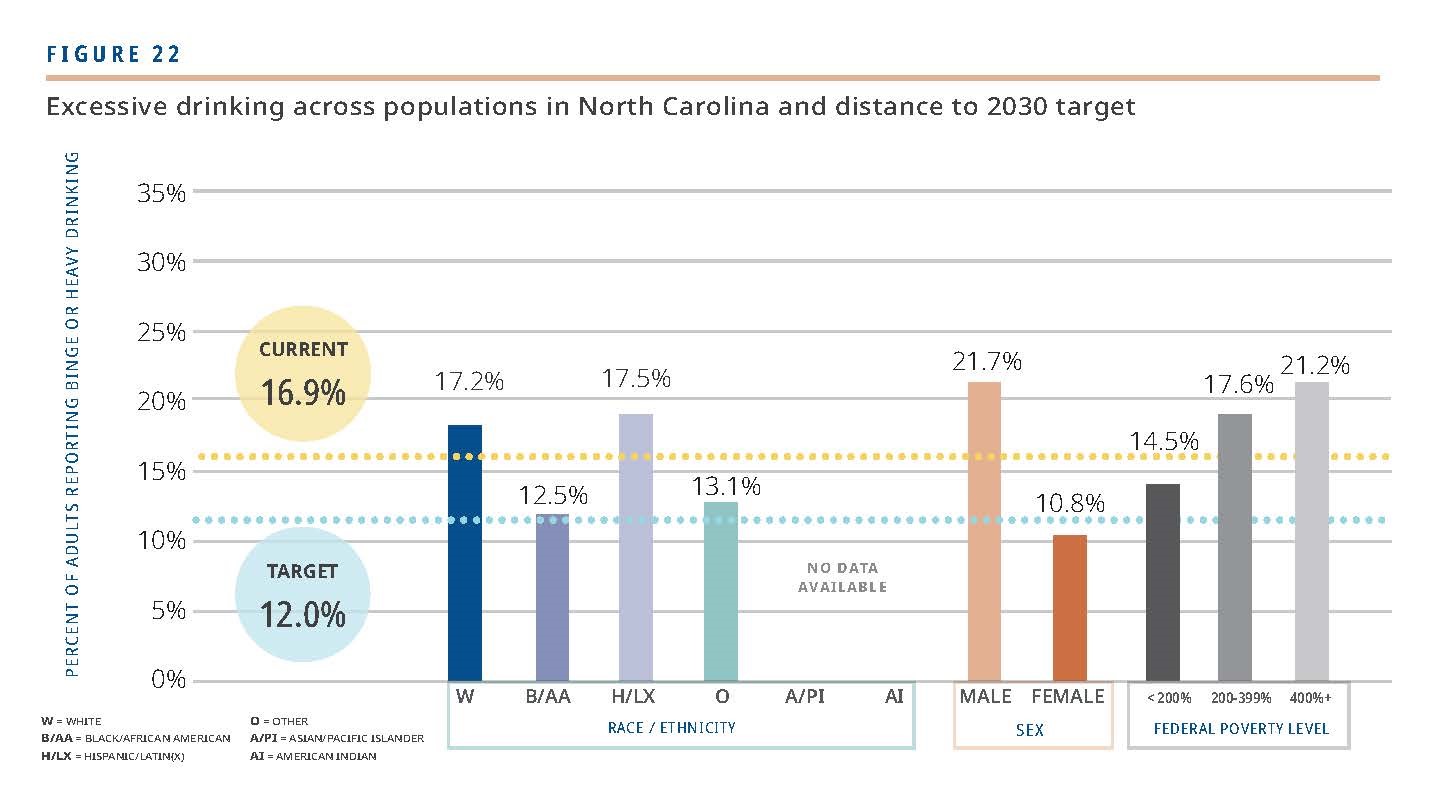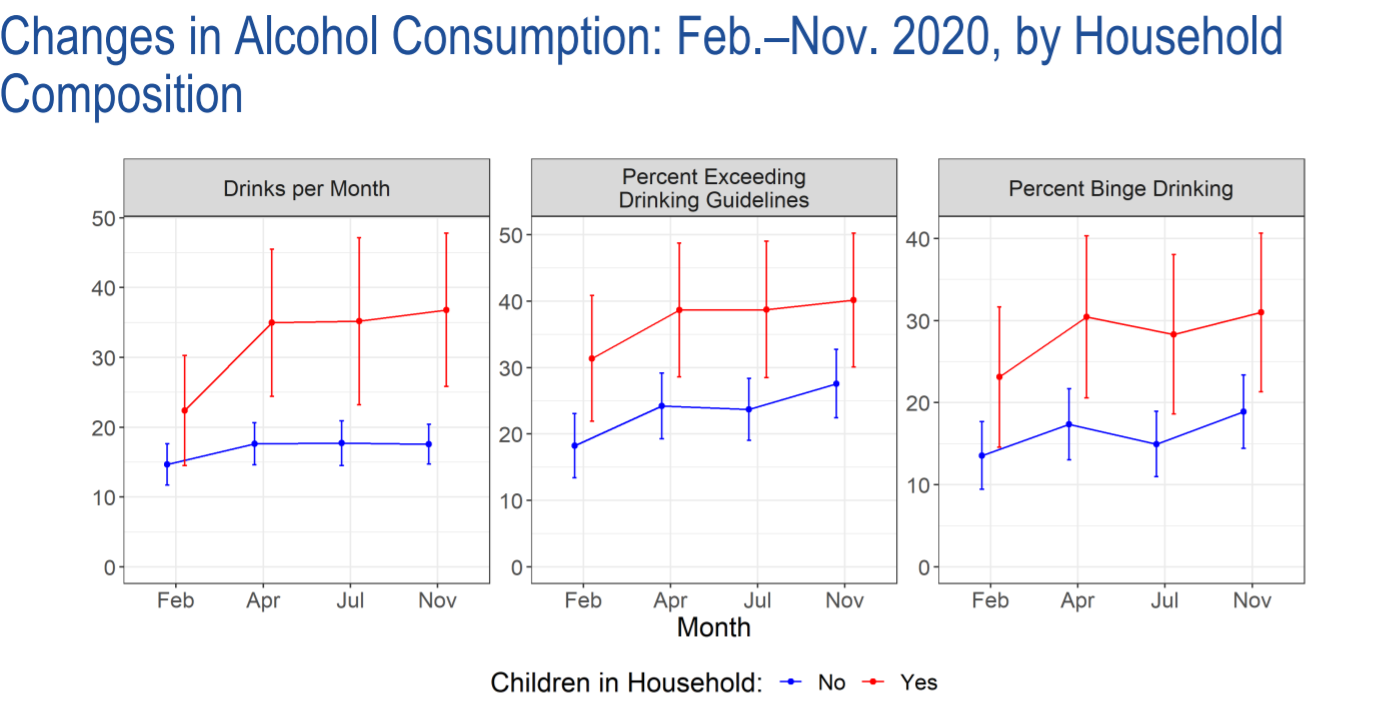

Decreasing excessive drinking rates is one of the 21 goals identified by the Healthy North Carolina 2030 Task Force, and was the focus of a panel at the October 20 North Carolina Institute of Medicine annual meeting.
Excessive drinking has serious health impacts and negatively affects individuals, families, communities, health systems, and the state as a whole. Individuals who consume alcohol excessively are more likely to have cardiopulmonary disease, cancers, mental health conditions, alcohol poisoning, and sexually transmitted infections. On a family and community level, excessive drinking contributes to increased rates of domestic violence, adverse childhood experiences (ACEs), motor vehicle accidents, and decreased productivity and educational attainment. Alcohol is the third leading cause of preventable death in North Carolina.
The NC DHHS Alcohol Data Dashboard defines binge drinking as four or more drinks on one occasion for women and five or more drinks on one occasion for men. Heavy drinking is defined as eight or more drinks per week for women and 15 or more drinks per week for men. Based on historical and forecasted data, the Healthy NC 2030 group set a target of 12% of adults reporting binge or heavy drinking by 2030, down from the 2018 rate of 16.9%.

The social isolation and stress of the pandemic resulted in increased alcohol consumption throughout 2020, both nationally and in North Carolina. A national study from RTI showed that some of the largest increases in consumption were observed in women and Black people. Another group that saw increased consumption were households with children, especially those with young children aged 0- 5.

Because of the stay-at-home orders, most respondents reported drinking at their home or someone else’s home, and therefore, children were exposed to excessive drinking and had greater access to alcohol in the home. With this in mind, panelists came together at the NCIOM annual meeting to discuss strategies for communities to address rising excessive drinking rates and potential state policy recommendations to help us reach the Healthy NC 2030 target.
The panel was moderated by Mike Yow, LCAS, president & CEO of Fellowship Hall, a substance use recovery center that offers residential treatment, outpatient treatment, halfway houses, and family therapy. Kurtis Taylor, the executive director of the Alcohol Drug Council of NC (ADCNC), reiterated the need for increased access to treatment. ADCNC provides information and referrals to alcohol and drug treatment through a 24/7 phone line (800-688-4232), and the services it connects individuals to are required to be accessible and affordable. Taylor also stressed the importance of prevention, which often starts with having conversations with youth. He serves as an ambassador for Talk It Out NC, a multimedia campaign and collection of resources to help parents and adults start conversations with young people and reduce underage drinking.
Mina Cook, project coordinator of the North Carolina Preventing Underage Drinking Initiative (NC PUDI), stressed the importance of communities and families changing systems to prevent underage drinking. Cook reiterated the importance of families thinking about the access points to alcohol within the home, recommending that adults lock up alcohol to prevent children from having access to it. Elinor Landess, director of the Chapel Hill Campus and Community Coalition, shared effective community strategies for limiting availability and accessibility of alcohol. The coalition focuses on national best practices, such as identifying the establishment where an individual receiving a DWI was last served alcohol and offering training for staff of that establishment.
The State Health Improvement Plan, a complement to Healthy NC 2030, proposes increasing the number of substance use treatment facilities in our state, as well as improving access to substance use treatment and preventive services.
Trauma-informed Systems
Caregivers of children continue to manage school and child care closures, while simultaneously navigating professional and personal stress caused by the COVID-19 pandemic. Many parents and caregivers have used alcohol to cope with the stress, isolation, and mental health issues caused by the COVID-19 pandemic. The 2017 report for the Task Force on Mental Health and Substance Use called for “the implementation of trauma-informed child and family serving systems across North Carolina counties.” Developing and sustaining trauma-informed systems will be critical to supporting families and children and preventing future ACEs, as well as reducing future excessive drinking rates.